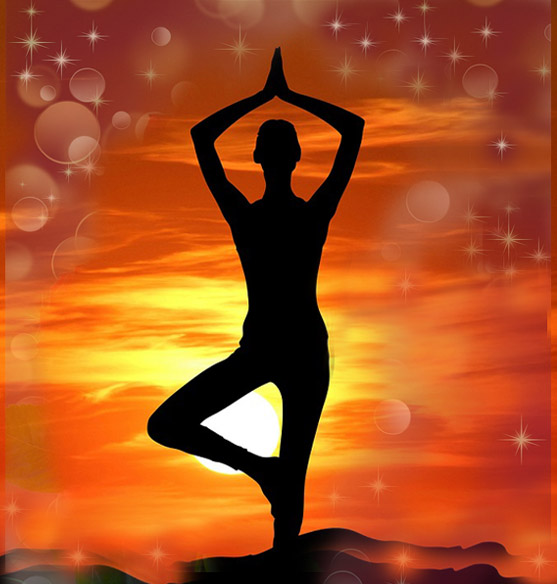
Yoga is very popular these days, and most people identify yoga with the physical practice – postures, or asanas. Quite often people start practicing yoga to increase flexibility and to reduce stress.
However, yoga is not simply a workout. Yoga is an ancient philosophy which teaches us how we can navigate life in a holistic way.
Yogic ethical principles are described in many ancient texts; the most well-known are The Yoga Sutras of Patanjali.
Patanjali outlines principals in an eight-limb system, or the eightfold path, called “ashtanga”, which literally means “eight limbs” (“ashta” means “eight”, “anga” means “limb”). These eight steps act as a framework for a morally disciplined, meaningful and purposeful life, which leads to self-realization and freedom. 8 limbs of yoga are guidelines that direct attention within ourselves, toward one’s health and inner wisdom.
The eight limbs of yoga are:
- Yamas – ethical guidelines on how to relate to the outside world; self-restraints that help in personal growth.
- Ahimsa – non-violence. This principle teaches us to behave in a way that nourishes growth and contributes to the life force around us.
- Satya – truthfulness. Yoga asks us to find our true, authentic self – and to act from this deep inner truth.
- Asteya – non-stealing. Yoga teaches us to respect other people’s belongings, energy, time, and resources.
- Brahmacharya – non-excess. This may be seen as total celibacy, but it is also treating our primal life force as sacred.
- Aparigraha – non-attachment. To live in a spiritually aligned way, we must trust that we always have enough.
- Niyamas – Practices to improve the self, which include virtuous habits and observances, how you relate to yourself.
- Shaucha – cleanliness. This includes not just physical cleanliness, but also refers to having a clean mind, having pure and positive thoughts about yourself and others.
- Santosha – contentment. Being content with what is in this very moment.
- Tapas – self-discipline, that allows us to grow and learn.
- Svadhyaya – self-study. Yoga is a process of direct inquiry into our internal world that has nothing to do with the outside world or how we are perceived by others.
- Ishvarapranidhana – devotion to the divine. Yoga asks us to let go of the need to control everything. When we allow ourselves to connect with the greater forces in our lives, surrendering to a higher power, we begin to navigate life with ease and awe.
- Asana – physical practice of yoga postures. According to yoga philosophy, the body is a temple, and taking care of it is an important stage of our spiritual growth. Physical practice prepares us for meditation; through the physical practice, we develop discipline and ability to concentrate, both of which are necessary for connecting with our inner wisdom.
- Pranayama – breath control. “Pranayama” originates from the Sanskrit words “prana” (life force or breath) and “ayama” (extension, expansion, and also control). Mindful breathing techniques are designed to recognise connection between the breath, the mind, and the emotions, to help us quiet our minds and calm down emotions, developing an energetic awareness of ourselves, all of which prepares us for dealing with the senses, the mind, and attaining a higher state of consciousness.
- Pratyahara – withdrawal of the senses. We withdraw from the outside distractions and direct our attention internally. The practice of pratyahara provides us with an opportunity to take a look at ourselves, our habits and our shadows that are might be destructive for our health and inhibit our inner growth.
- Dharana – concentration. The practice of concentration allows us to deal with the distractions of the mind itself.
- Dhyana – meditation. Meditation or contemplation is the uninterrupted state of concentration; the mind has been quieted, and becomes still, bringing us into the ideal state of consciousness.
- Samadhi – absorption, a state of pure bliss and being at one with the whole Universe. This is connecting with our inner wisdom. This is the state of pure joy, fulfillment, and freedom. This is when we find peace deep within ourselves. This ultimate stage of yoga – enlightenment – can only be experienced by the continual devotion and practice of the participant.
✨ The journey of the eight limbs of yoga is meant to take us from the state of doing to just being. Practicing yoga helps us manage our daily stress and teaches us to express, expand, grow, and – just be.
✨ The teachings of yoga remind us that we are already whole, our Soul is already whole and we are already enough. We are complete. There is no accomplishment in this life that can make our souls better.
✨ Yoga teachings remind us that when we access our inner wisdom, the wisdom of our body and the power of our mind, we can see clearly that this life is a gift, and we can fill our lives with joy and peace – in this moment, now.
✨ Yoga touches something deep within us. It starts with one breath, one posture, one movement, one class – a wonderful journey into health, peace and harmony. 💗



0 Comments